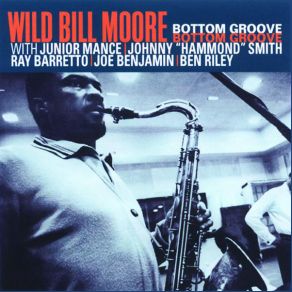Bottom Groove (Reissue)
Download links and information about Bottom Groove (Reissue) by (Wild) Bill Moore. This album was released in 1961 and it belongs to Jazz genres. It contains 13 tracks with total duration of 01:16:18 minutes.

|
|
|---|---|
| Artist: | (Wild) Bill Moore |
| Release date: | 1961 |
| Genre: | Jazz |
| Tracks: | 13 |
| Duration: | 01:16:18 |
| Buy it NOW at: | |
| Buy on iTunes $9.99 | |
Tracks
[Edit]| No. | Title | Length |
|---|---|---|
| 1. | Heavy Soul | 6:44 |
| 2. | A Good 'Un | 5:56 |
| 3. | Tearin' Out | 5:26 |
| 4. | Wild Bill's Beat | 6:49 |
| 5. | Things Are Getting Better | 5:09 |
| 6. | Bubbles | 5:17 |
| 7. | Just You, Just Me | 5:14 |
| 8. | Sister Caroline | 6:19 |
| 9. | Bottom Groove | 5:36 |
| 10. | My Little Girl | 5:34 |
| 11. | Down With It | 5:34 |
| 12. | Sea Breezes | 7:10 |
| 13. | Caravan | 5:30 |
Details
[Edit]Many of the tenor saxophonists who came out of the honker school of the '40s and early '50s had no problem being relevant to the soul-jazz scene of the '60s. That's because '60s soul-jazz was very much an extension of classic honker music; the recordings that big-toned tenor titans like Willis "Gator" Jackson and Arnett Cobb provided in the '60s were not a radical departure from their early sessions. Influenced by Illinois Jacquet and Chu Berry, Wild Bill Moore was the essence of an extroverted, big-toned, hard-blowing honker — he epitomized what critic Scott Yanow calls "rhythm & jazz" (that is, jazz with strong R&B leanings). This 76-minute CD, which Fantasy assembled in 2002, reissues two Orrin Keepnews-produced albums that Moore recorded for Jazzland in 1961: Bottom Groove and Wild Bill's Beat. Both albums employ Joe Benjamin on upright bass, Ben Riley on drums, and Ray Barretto on congas, but while Wild Bill's Beat features pianist Junior Mance, Bottom Groove is an organ date with Johnny "Hammond" Smith (one of the countless Jimmy Smith-minded organists who was active in the '60s). Despite the fact that one album has a pianist and the other has an organist, they are quite similar. Both are state-of-the-art soul-jazz, and both are highly accessible; people who, in the '60s, felt that a lot of post-swing jazz was too cerebral and abstract for its own good had no problem getting into straightforward players like Moore. Soulful accessibility is the rule whether Moore is playing original material or turning his attention to Nat Adderley's "Sister Caroline" and Duke Ellington's "Caravan." Naturally, there are plenty of 12-bar jazz-blues grooves, and Moore shows listeners how appealing a ballad player he could be on the dreamy "Sea Breezes." This CD is well worth acquiring if you have a taste for '60s soul-jazz.